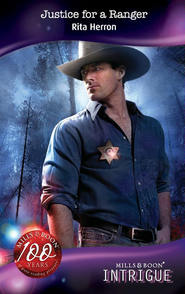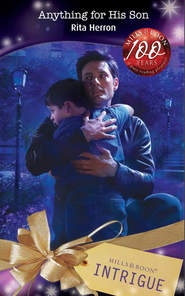По всем вопросам обращайтесь на: info@litportal.ru
(©) 2003-2024.
✖
Cold Case at Camden Crossing
Автор
Год написания книги
2018
Настройки чтения
Размер шрифта
Высота строк
Поля
Vanished from a town in New Mexico in the middle of the night. A runaway or a kidnapping?
He studied the picture, his gut knotting. She was a brunette like his sister, Ruth, had been. Same innocent smile. Her life ahead of her.
And according to her parents, a happy well-adjusted teenager who planned to attend college. A girl who never came home after her curfew.
They thought someone had kidnapped her just as he’d suspected someone had abducted Ruth and Peyton after that horrendous bus crash.
Not that New Mexico was close enough to Camden Crossing, Texas, that he thought it was the same sicko.
But close enough to remind him of the tragedy that had torn his family apart.
The door to the sheriff’s office burst open, and he frowned as his father walked in. Gerome Camden, a banker and astute businessman, owned half the town and had raised him with an iron fist. The two of them had tangled when he was growing up, but Ruth had been his father’s pet, and it had nearly killed him when she’d disappeared.
“We need to talk,” his dad said without preamble.
Chaz shoved the flier about the missing girl beneath a stack of folders, knowing it would trigger one of his father’s tirades. Although judging from the scowl on his aging face, he was already upset about something.
Chaz leaned back in his chair. “What is it, Dad?”
“Tawny-Lynn Boulder is back in town.”
Chaz stifled a reaction. “Really? I heard she didn’t want a memorial service for her father.”
The gray streaks in his father’s hair glinted in the sunlight streaming through the window. “Who could blame her? Eugene Boulder was a common drunk.”
“Guess that’s how he dealt with Peyton going missing.”
Unlike his father who’d just turned plain mean. Although he’d heard Boulder had been a mean drunk.
“Don’t make excuses for that bastard. If Tawny-Lynn hadn’t faked that amnesia, we might have found Ruth a long time ago.”
Chaz started to point out for the hundredth time that the doctors said the amnesia was real, but his father didn’t give him time.
“Bannister handled the will. The ranch is hers.”
Chaz sighed and tapped his foot under the desk. “That’s no surprise. Tawny-Lynn was his only living relative. It makes sense he’d leave her White Forks.”
His father’s cheeks reddened as he leaned forward on the desk, his anger gaining steam. “You need to make sure she doesn’t stay. This town barely survived that girl years ago. We don’t need her here as a reminder of the worst thing that ever happened in Camden Crossing.”
Chaz had heard enough. He stood slowly, determined to control the anger building inside him. Just because his father was a big shot in Camden Crossing, he refused to let him push him around.
“Dad, I’m the sheriff, not your personal peon.” His father opened his mouth, his hands balling into fists, but Chaz motioned him to hear him out. “My job is to protect the citizens of this town.”
“That’s what I’m saying—”
“No, it’s not. You all ran roughshod over a sixteen-year-old girl who was traumatized and confused. And now you want me to make her leave town?” He slammed his own fist on the desk. “For God’s sake, Tawny-Lynn lost her sister that day. She was suffering, too.”
She’d been injured, although someone had pulled her free from the fire just before the bus had exploded, taking the driver and three other classmates’ lives. The other teammates would have probably died, too, if they’d ridden the bus.
At least they’d speculated that someone had rescued Tawny-Lynn. But no one knew who’d saved her.
And no one else had survived. So how had she escaped?
“She knew more than she was telling,” his father bellowed. “And no one wants her here now.”
An image of a skinny, teenage girl with wheat-colored hair and enormous green eyes taunted him. Tawny-Lynn had lost her mother when she was three, had adored her sister, Peyton, and suffered her father’s abuse.
“You don’t know that she even wants to stay. She probably has a life somewhere else. But if she does decide to live at White Forks, that’s her right.”
“She doesn’t give a flying fig about that property or this town. Else she wouldn’t have run the way she did.”
“She went to college, Dad. Besides, you could hardly blame her for leaving,” Chaz said. “No one here seemed to care about her.”
“You listen to me, Chaz,” his father said as if Chaz were still twelve years old. “I’m not just speaking for myself. I’ve discussed this with the town council.”
Two of the members who’d also lost girls that day served on the council now.
“That ranch is run-down,” his father continued. “Just pay her a visit and tell her to sell it. Hell, I’ll buy the damn property from her just to force her out.”
Chaz couldn’t believe that his father was so bitter. That bitterness had festered inside and turned him into a different man.
And not in a good way.
“You want me to go see her and write her a check myself?”
Chaz gritted his teeth. “No, I’ll talk to her. But—” He gave his father a stern look. “I’m not going to run her off. I’ll just ask her what her plans are. For all we know, she’s here to hang a for-sale sign and you’re in an uproar for nothing.”
His father wiped a bead of perspiration from his neck. “Let me know.” He strode to the door, but paused with one hand on the doorknob. “And remember what I said. If you don’t get rid of her, I will.”
Chaz narrowed his eyes. “That sounds like a threat, Dad.”
His father shrugged. “Just thinking about the town.”
He couldn’t believe his father had held on to his anger for so long. “Well, don’t. Leave her alone and let me do my job.”
In fact, he would pay Tawny-Lynn a visit. Not to harass her, but to find out if she’d remembered anything else about the day of the crash.
Something that might help him find out what happened to their sisters.
* * *
TAWNY-LYNN SHIVERED as she climbed from her SUV and surveyed White Forks. The ranch consisted of fifty acres, just a small parcel of the original two hundred acres that had been used to breed livestock.
But her father had sold it off to make ends meet long ago, and now the barns and stables were broken down and rotting. The chicken coop had been ripped apart in a storm. The roof needed new shingles, and the grass had withered and died—only tiny patches of green poking through the dry ground.
Spring was fading into summer, the weeds choking the yard and climbing near the front porch. The big white farmhouse that she’d loved as a little girl needed painting, the porch was sagging and the shutters hung askew as if a storm had tried to rip them from the frame of the house.
As though the life had been ripped from it the day Peyton had gone missing.











